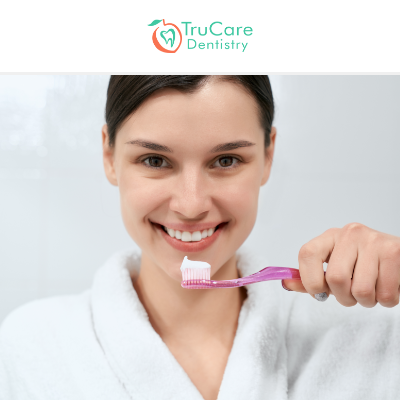
Are you using the same toothbrush for months to brush your teeth? If yes, then it’s time to change your old toothbrush to a new one. It is important to keep changing the old toothbrush to get the most out of your brushing sessions. Changing a toothbrush after a certain period helps better clean teeth and prevents you from getting sick. Several dentist recommendations and manufacturer guidelines suggest that a toothbrush should be replaced every 12 to 16 weeks. In some cases, a toothbrush might require a replacement sooner. Not changing the toothbrush on time can have negative effects on dental health. Besides, it might cause and spread infection as well.
What are the advantages of using a good-quality toothbrush?
Some of the key benefits of using a good toothbrush include:
- A toothbrush is an important dental tool that protects our teeth against bacteria that can cause various dental issues like tooth decay, bad breath, gum disease, etc.
- The stiff and soft bristles in the toothbrush can gently remove the excess plaque from the teeth.
- A toothbrush can effectively remove any food particles that get collected at the base of the teeth.
- As per the standard dentist recommendation, brushing teeth at least for 2 minutes twice a day can protect the teeth from cavities and other dental problems.
- Brushing teeth after each meal or after consuming sugary food can help to prevent the issue of tooth decay.
Reasons to Replace your toothbrush
Some of the key reasons to replace your toothbrush include:
- When the bristles of your toothbrush start falling out, become dull, or not remain stiff as they were earlier, it is time to change your toothbrush.
- In case of a viral or bacterial infection in a family member, it is advisable to replace yours as well as the toothbrush of everyone else in your household.
- Children’s toothbrushes may require replacement even before every three months. Children usually squash or chew their toothbrush head or handle while brushing their teeth.
- Parents must also watch their children brush their teeth to ensure that they are not exposing their brush to any other surfaces (especially dirty surfaces) besides their teeth. If they do so, replace their toothbrush immediately to prevent the chances of bacteria buildup or infection.
- If someone uses another’s toothbrush by mistake or for any reason, it is strongly advised to remove it.
When to change the toothbrush?
When we brush our teeth twice a day daily, within a period of time, the bristles in the toothbrush start falling out or become dull and worn out. This happens due to the reason that the bristles are made of nylon material. When they are continuously exposed to water and chemicals in the toothpaste, they lose their stiffness and become weaker with each use. When bristles get weaker, they start bending and twisting, which is also known as bristle flaring. Within about three months, you will notice that your toothbrush has become old and not give that effective result.
As soon as the bristles of your toothbrush start losing their stiffness, it’s a sign that it needs a replacement. It is advisable by the CDC (Centers for Disease Prevention and Control) that one must replace their toothbrush either every 3 to 4 months or whenever as soon as it appears to be getting worn out.
Many people make use of an electric toothbrush. These kinds of toothbrushes can clean the teeth by quickly rotating or vibrating at different surface areas. However, as the head of these toothbrushes is made of nylon bristles, these can also wear out after regular usage. Therefore, it is advisable to replace the electric toothbrush head every 12 weeks or even earlier based on the condition of the bristles.
Tips to take care of your toothbrush
As a toothbrush helps to take care of the health of our teeth, we should also take proper care of our toothbrush to get the most out of it. Some of the key tips to maintain the good condition and hygiene of your toothbrush are:
- After brushing your teeth, make sure to rinse your toothbrush properly with clean tap water. Do not use hot water, a disinfectant, or mouthwash to sanitize it as it may spread germs.
- Keep your toothbrush in a clean container (not necessarily in a closed container) after every use.
- If you are keeping your toothbrush in a container where other toothbrushes are also stored, make sure that the heads of toothbrushes are not touching each other.
- Never share your toothbrush with anyone. Not even with your close family members to prevent the spread of bacteria or other diseases.
So these are some of the key tips to take care of your toothbrush to achieve the best possible results. However, as soon as you notice bristles flaring in your toothbrush, get it replaced immediately. Those who do not pay attention to replacing their toothbrushes may experience a huge amount of plaque buildup, bad breath, and other oral hygiene issues. These issues may further lead to severe teeth and gum problems such as tooth decay, gum disease, cavities, and many others.
Conclusion:
For better oral health care, always be watchful about the signs of wear and tear on the bristles of your toothbrush. Replace it every three months or soon based on its condition. For any kind of oral health care service or advice related to dental care, get in touch with TruCare Dentistry. We have a team of experienced dentists and staff who provide regular checkups and cleaning services with the intent to maintain the healthy smiles of their patients.
